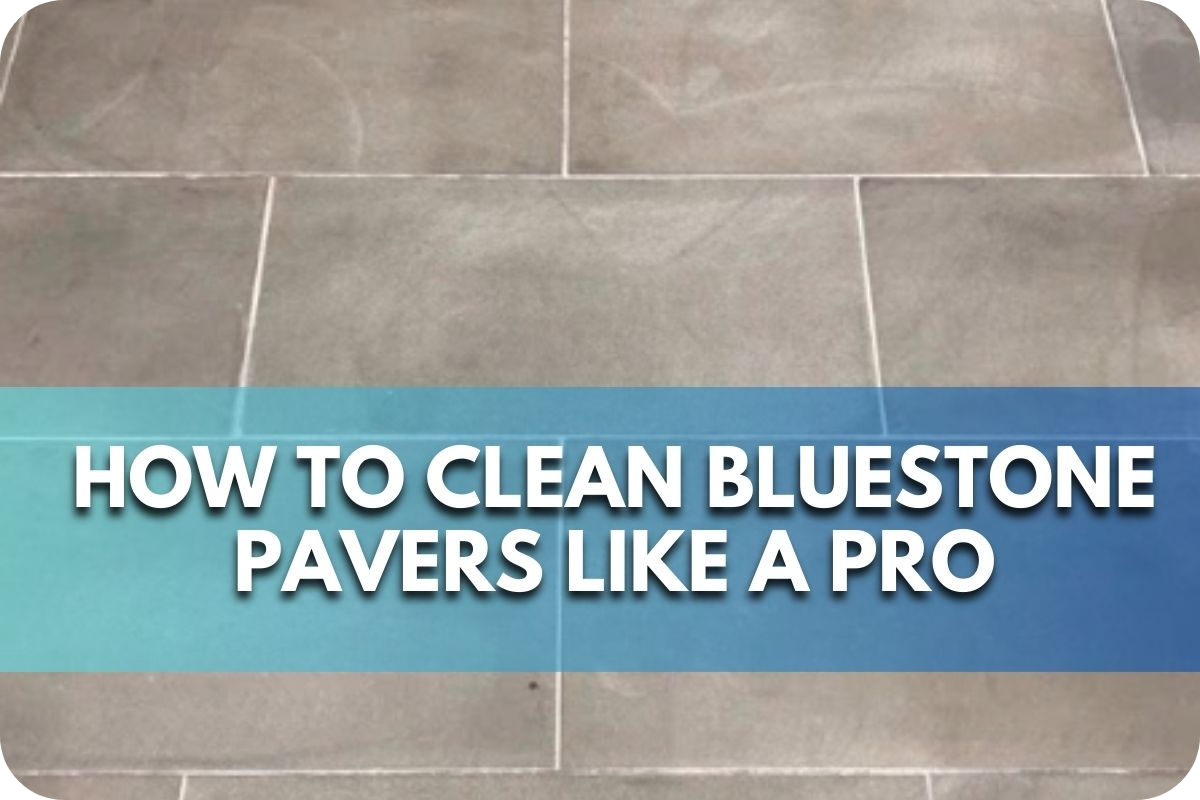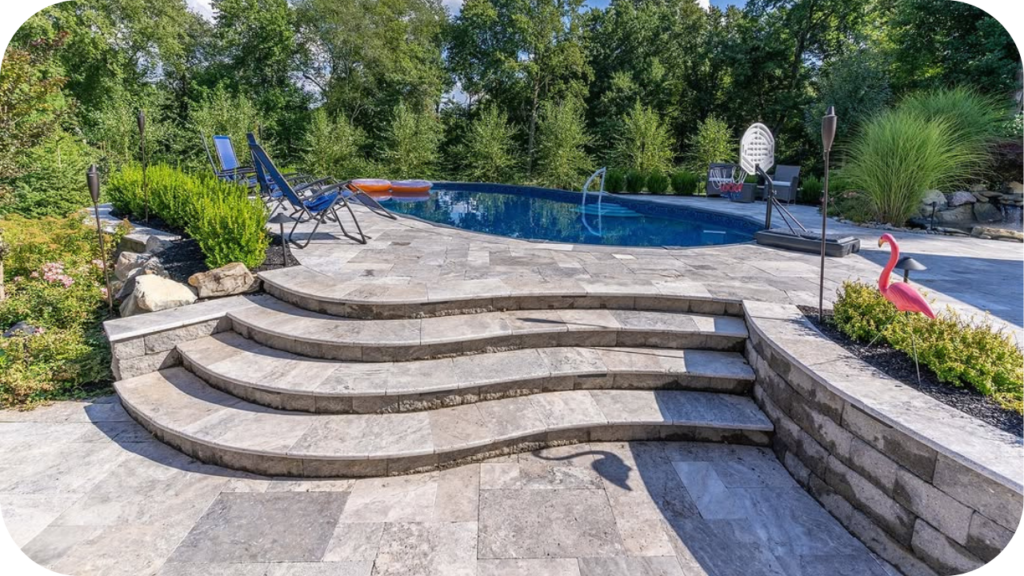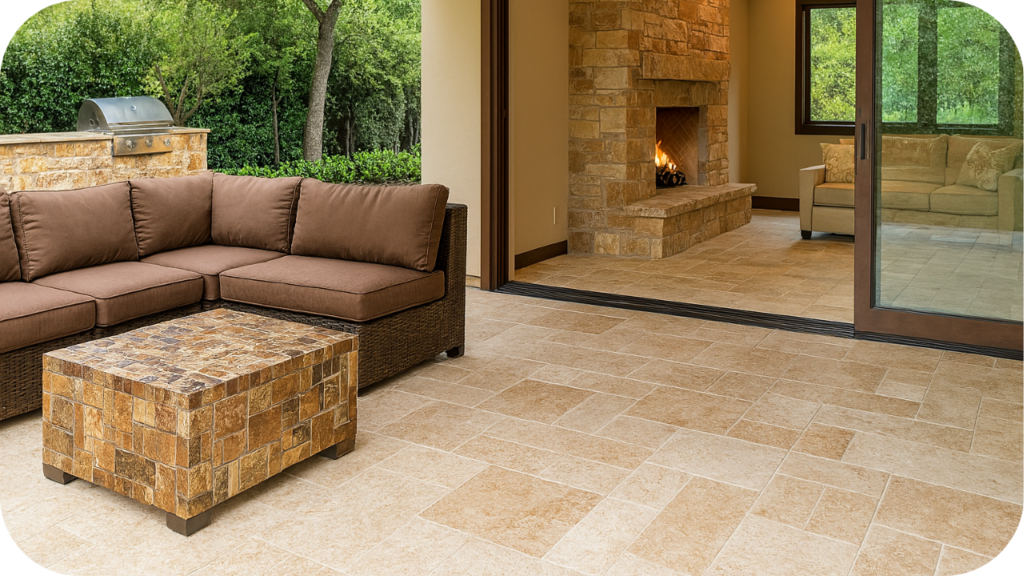
Bluestone pavers add a touch of elegance to your outdoor space, but they can become stained and dull-looking over time, diminishing their beauty.
Scrubbing and using harsh chemicals might seem like the solution, but they can damage the delicate stone and leave unsightly marks.
Fortunately, there are insider tips and tricks that professionals use to clean bluestone pavers effectively without causing any harm, restoring their natural lustre and making them look brand new.
Method 1: Removing Stains
With the right approach, removing stains from bluestone pavers can be straightforward. For organic stains, such as those from leaves or food, start by applying a mixture of mild dish soap and water.
Use a soft-bristled brush to scrub the stained area gently, ensuring you don’t damage the stone’s surface. A commercial degreaser works best for tougher stains, like oil or grease. Apply the degreaser, let it sit for a few minutes, then scrub with a brush and rinse thoroughly with water.
If you encounter rust or paint stains, use a specialised cleaner. For rust, wet the area and apply a rust remover, following the manufacturer’s instructions carefully to avoid damaging the pavers.
For dried paint, gently scrape off as much as possible before applying a suitable solvent. First, always perform a patch test on a small, inconspicuous area to ensure the cleaner doesn’t discolour the stone.
For all stains, it’s crucial to rinse the area thoroughly after cleaning to remove any residual cleaning agents, which can attract dirt if left behind. Regular maintenance and prompt stain treatment will keep your bluestone pavers looking pristine and extend their lifespan.
Method 2: Using Soap and Water
Cleaning bluestone pavers with soap and water is a straightforward and effective method to maintain their appearance. This approach is ideal for regular maintenance and light cleaning tasks.
Start by preparing your cleaning solution. Mix warm water with a few squirts of gentle dish soap in a large bucket until it forms a foamy solution. Using a mild, pH-neutral soap is crucial to avoid damaging the bluestone.
Before applying the solution, remove any loose debris or dirt from the pavers by sweeping with a soft-bristle brush. This helps prevent scratching the surface during the cleaning process. Once the area is clear, pour the soapy water over the pavers.
Using a soft-bristle brush, scrub the surface gently in circular motions. Focus on areas with visible dirt or mild stains, ensuring you don’t apply excessive pressure, which could scratch the stone. After scrubbing, rinse thoroughly with clean water to remove all soap residues, which can attract dirt if left behind.
Allow the pavers to air dry completely. This method keeps your bluestone pavers clean and helps preserve their natural beauty and durability.
Method 3: Regular Cleaning Routine
Maintaining a regular cleaning routine for your bluestone pavers is essential to keep them looking pristine and extending their lifespan. Use a soft-bristle brush or a broom to remove loose debris, such as leaves, dirt, and dust. This prevents abrasive materials from scratching the paver surface during cleaning.
Next, prepare a cleaning solution by mixing warm water with a few drops of pH-neutral dish soap in a large bucket. This mild solution effectively removes everyday dirt and grime without damaging the stone.
Pour the soapy water over the pavers and use a soft-bristle brush to scrub the surface gently, working in circular motions. Be thorough in your scrubbing, especially in areas with visible dirt.
After scrubbing, rinse the pavers thoroughly with clean water to remove any soap residue, which can attract more dirt if left behind. Using a garden hose with a gentle spray setting is ideal for this purpose. Once rinsed, allow the pavers to air dry completely.
To keep your bluestone pavers in top condition, Perform routine cleaning at least once a month or more frequently in high-traffic areas.
Method 4: Deep Cleaning Techniques
Deep cleaning of your bluestone pavers is necessary for a thorough cleaning. This will tackle embedded dirt, stains, and grime that regular cleaning may miss. Begin by soaking the pavers with water for 15-20 minutes to loosen dirt and debris. This pre-soaking step helps to soften any tough grime, making it easier to remove.
Mix a pH-neutral cleaner with warm water for a more robust cleaning solution. Ensure the cleaner is specifically designed for natural stone to avoid damage. Apply the solution generously over the pavers, allowing it to sit for a few minutes to break down stubborn stains and dirt.
Using a stiff-bristle brush, scrub the pavers thoroughly, focusing on heavily stained areas. For adamant stains, such as oil or grease, use a specialised degreaser or a poultice made from baking soda and water. Apply the poultice, let it sit until dry, then scrape off the residue and rinse.
After scrubbing, rinse the pavers thoroughly with clean water to remove any remaining cleaning solution. Consider using a pressure washer on a low setting for an extra deep clean, but be cautious to avoid damaging the stone.
To maintain the pristine condition of your bluestone paver, perform deep cleaning once or twice a year or as needed.
Method 5: Preventative Measures
Implementing preventative measures is crucial to maintaining the pristine condition of your bluestone pavers and reducing the need for intensive cleaning. Begin by sealing the pavers with a high-quality stone sealer.
Sealing creates a protective barrier that repels water, oil, and stains, making them easier to clean and preventing damage from the elements. Choose a sealer specifically designed for natural stone to ensure compatibility and effectiveness.
Regular sweeping and prompt spill cleanup can significantly reduce the buildup of dirt and stains. Removing debris such as leaves, dirt, and other organic matter prevents the potential for staining and moss growth.
Additionally, blotting up spills immediately with a clean cloth helps prevent stains from setting into the stone.
Placing mats or rugs at entry points can also minimise the amount of dirt and debris tracked onto the pavers. This simple step can significantly reduce wear and tear, especially in high-traffic areas. Another effective measure is to rinse the pavers with clean water regularly, particularly after rainfall, to wash away any surface contaminants.
Troubleshooting Common Problems
Even with regular maintenance, bluestone pavers can experience some common issues. Here’s how to troubleshoot them effectively:
- Stains: Oil, food, and organic materials can mar the appearance of your bluestone pavers. To tackle stains, use a pH-neutral cleaner and a soft brush. Consider using a poultice made of baking soda and water for tougher stains. Apply the poultice, dry it, scrape off the residue, and rinse thoroughly.
- Weed Growth: Weeds can sprout between pavers, leading to unsightly gaps and potential damage. Regularly inspect and manually remove weeds or apply a non-toxic weed killer. Sealing the pavers can also help prevent weed growth by creating a protective barrier.
- Efflorescence: Salt deposits cause this white, powdery residue on the stone surface. To remove efflorescence, use a specialised cleaner designed for natural stone. Ensure proper drainage to prevent water accumulation, which can exacerbate this issue.
- Loose Pavers: Pavers can become loose due to ground shifting or improper installation. To fix loose pavers, lift the affected stone, add a layer of sand beneath, and tamp it down firmly before replacing the paver. This helps maintain a stable and level surface.
- Cracks and Chips: These can occur from heavy impact or freeze-thaw cycles. Repair cracks and chips promptly using a suitable stone repair compound. Regular sealing can also help protect the pavers from such damage.
Conclusion
Mastering the cleaning of bluestone pavers enhances their beauty and longevity. With regular maintenance and proper techniques, your outdoor space can remain stunning.
Contact us at Splendour in Stone today for expert assistance or to explore high-quality cleaning products. Keep your bluestone pavers looking pristine and elegant effortlessly!
.
More To Explore

10 Advantages of Travertine Tiles for Outdoor Landscaping
Travertine tiles remain a popular choice for outdoor landscaping thanks to their balance of natural elegance, durability, and adaptability. Formed over centuries, each tile carries

8 Design Ideas with Outdoor Travertine Tile
Travertine tiles have long been a favourite for outdoor paving, prized for their natural elegance and adaptability across different design styles. Formed over centuries, each


